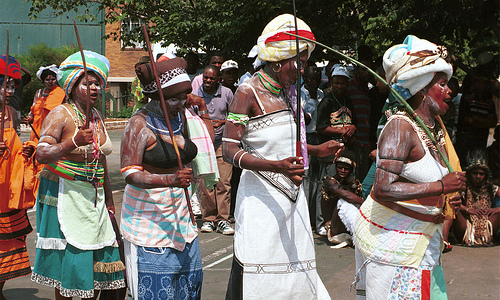Understanding the Languages of South Africa

South Africa has eleven official languages. Each one of these languages affects each other as well. They all have words from one another, and the different accents also alter the dialect.
If you move to South Africa, you must pay careful attention to what language is appropriate to your province. Because South Africa was colonized by the Dutch and the British, Afrikaans (a descendant of Dutch) and English are main languages. However, there is still a strong identity with the descendants of pre-colonial populations, and many of the languages are preserved.
Afrikaans
About 13% of people in South Africa consider Afrikaans to be their mother tongue. Many colored and white people speak it at home. Afrikaans is rooted in 17th century Dutch. Today, it is a conglomerate of languages with adaptations from English, Malay, German, Portuguese, French and African languages. It is spoken mainly in the West side of the country. Though European in roots, most of its speakers are not white. It started as Cape Dutch, during the Dutch colonial period, which was a spoken language rather than written formal Dutch. It has played a role in South African nationalism, being unique to the country, as well as part of the rebellions against apartheid.
English
Around the country of South Africa, many people understand English. It is best to know English if you do not know any other ones of these languages. English is used in business, politics and the media. However, at home, most people do not speak English. The South African version of English has taken many words from Afrikaans, isiZulu and all the others. It sounds different depending on what part of the country you are in. About 8% of people in South Africa consider English to be their mother tongue. English is spoken by some white people, and almost all of the Indians and Asians that live in South Africa; most Asians, some coloreds and some whites speak it at home. Most of its speakers are located in the Eastern part of the country. Everyone studies English in school nowadays, so English speakers will have an easy time communicating with the younger generation in urban locations.
IsiNdebele
Less than 2% of people in South Africa consider isiNdebele to be their mother tongue. It is a black language, part of the Nguni family. This language is spoken all throughout the country, especially in the provinces of Limpopo, Mpumalanga and Gauteng. It is a tonal language that is governed by the noun in the sentence.
IsiXhosa
About 17% of of people in South Africa consider isiXhosa to be their mother tongue. It is considered a Nguni language, similar to the others. It is mainly a black language, and is the most popular home language in the country. It is spoken mainly in the southeastern part of the country. It is also a tonal language.
IsiZulu
About 23% of people in South Africa consider isiZulu to be their mother tongue. It is a black language, and is part of the Nguni family. This language belongs to South Africa’s largest ethnic group, the Zulu. It is a tonal language, that is concentrated mainly in the central south eastern part of the country. It is more widely understood than the other South African African languages.
Sepedi
About 9.5% of people in South Africa consider Sepedi to be their mother tongue. It is a black language, part of the Sotho family. This language is mostly spoken in the Limpopo and Gauteng provinces, in the north eastern part of the country. It is also known as “northern Sotho.”
Sesotho
About 8% of people in South Africa consider Sesotho to be their mother tongue. It is a black language, part of the Sotho family. This language is spoken in the country of Lesotho, which is engulfed by the country of South Africa. This language has extensive literature. It is also known as “southern Sotho.”
Setswana
About 8% of people in South Africa consider Setswana to be their mother tongue. It is a black language, part of the Sotho family. This language is mostly spoken in Botswana, another African nation. In South Africa, most of its speakers are in the north central part of the country. It was the first Sotho language to be put into written form.
SiSwati
About 2.7% of people in South Africa consider siSwati to be their mother tongue. It is a black language, part of the Nguni family. This is the language of the Swaziland, and is spoken in the part of eastern South Africa that borders Swazi territory.
Tshivenda
About 2% of people in South Africa consider Tshivenda to be their mother tongue. It is a black language. It is a more isolated language from the other roots, that is mainly spoken in north eastern South Africa, around Zimbabwe.
Xitsonga
About 4% of people in South Africa consider Xitsonga to be their mother tongue. It is a black language that is mostly spoken around eastern Limpopo and Mumalanga.
There are even more unofficial languages spoken in South Africa, including Khoi, Nama, Arabic, German, Greek, Hebrew, Hindi, Portuguese and more.
